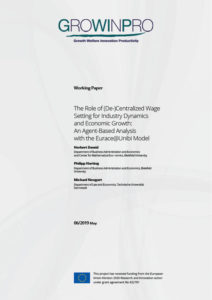In this paper, we employ the agent-based macroeconomic Eurace@Unibi model to study the economic implications of different degrees of de-centralization in the wage setting. Starting from a baseline scenario, corresponding to a high degree of unionization, in which wages are fully centralized and indexed on economy-wide productivity gains and inflation, we investigate how an increasing level of de-centralization affects the dynamics of output, employment, inequality, and market concentration. We think of decentralization as wages being a weighted average of an economy-wide ‘union wage’ and a firm-specific component depending on the firm’s productivity and the experienced tightness of the labor market. Our findings suggest that stronger centralization of the wage setting process induces lower wage inequality and stronger concentration on the consumption good market. Furthermore, due to more physical investments, an economy with more centralized wage setting is characterized by higher productivity and faster economic growth.

 The Role of (De-)Centralized Wage Setting for Industry Dynamics and Economic Growth: An Agent-Based Analysis with the Eurace@Unibi Model
The Role of (De-)Centralized Wage Setting for Industry Dynamics and Economic Growth: An Agent-Based Analysis with the Eurace@Unibi Model